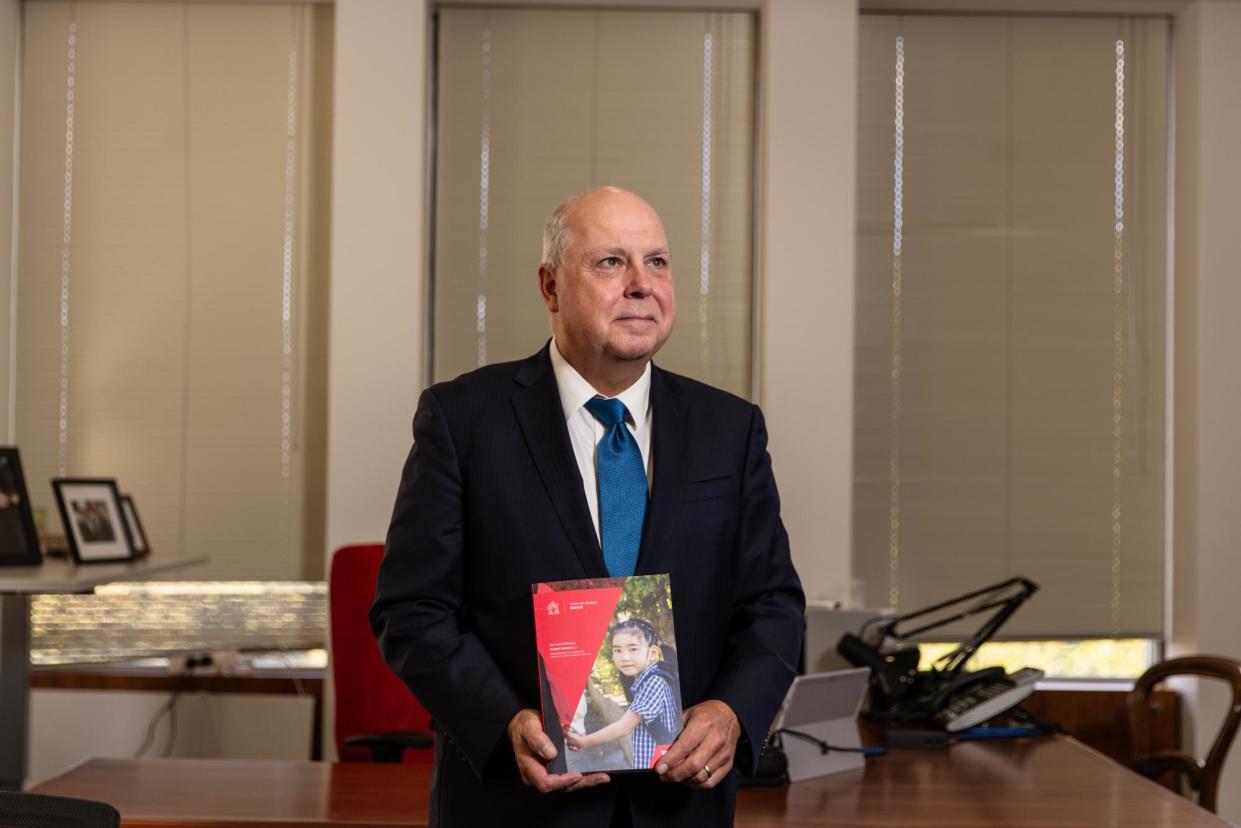Victorian state budget 2024: airport train delayed and sick leave for casuals scrapped in bid to rein in debt

The Victorian government will delay construction of the long-awaited Melbourne airport rail by at least four years, postpone key election promises and scrap its lauded paid sick leave scheme for casuals in an effort to bring its growing debt under control.
The Victorian treasurer, Tim Pallas, said he has been forced to make “sensible and disciplined decisions” to combat the state’s “two big problems” of high inflation and workforce shortages in his 10th budget, handed down on Tuesday.
This includes putting off the Melbourne airport rail by at least four years and increasing several taxes.
“We need to be realistic about the project and its timeline,” Pallas said of the rail project in his budget speech to parliament.
“[It] is now at least four years delayed.”
In 2020, the state and federal government each committed $5bn to the Melbourne airport rail. But Victoria has been locked in a dispute with the airport’s operators, who have insisted on constructing a costlier underground station.
Pallas said the federal government had only “recently” appointed an independent mediator to work through the issue, while the airport “has not indicated it is prepared to drop its demands for compensation and an underground station”.
“Believe me, we are not doing either of those things,” the treasurer told reporters. “So we’re at a standoff and I think we need to recognise that ending that standoff will take some time.”
A Melbourne Airport spokesperson said the government had rejected a 2019 offer, as part of a consortium, to invest $7bn in an underground airport station and express tracks from Sunshine. But a government spokesperson said the proposal would have been a “terrible deal” for Victorian commuters and taxpayers, by privatising a proposed Geelong fast rail line for 40 years.
Pallas said putting off the project allowed the state to “get on with delivering other projects”. However, the government’s total spend on infrastructure will decline from a peak of $24bn in 2023-24 to $15.6bn at the end of the forward estimates.
The government’s Suburban Rail Loop will also be affected, with the completion date for early works on the eastern section pushed back from mid-2025 to early 2026.
Meanwhile, plans for a medical precinct in North Melbourne have also been scrapped due to “electromagnetic interference” from the new Arden train station. The government will instead expand the Royal Melbourne and Royal Women’s hospitals, allocating $2.3bn to this work.
Pallas said the expanded rollout of free kinder and the mental health and wellbeing local hubs – both key commitments at the 2022 election – will go ahead “gradually”, due to workforce shortages.
While no new taxes have been announced, there will be increases to the waste and fire services levies, which will reap $423m and $591m, respectively.
However, a standalone tax exemption for land used to provide social and emergency housing will be introduced.
Pallas said the budget was “firmly focused on the things that matter to families”, with the introduction of a $400 payment for every child at government schools, totalling $287m.
The homebuyer fund, a shared-equity scheme to help people buy homes, has also been extended for one year – before the commonwealth establishes a national scheme – costing $700m.
Related: Victorian Greens shape up for housing fight over Labor’s proposed Airbnb levy
The budget shows Victoria’s net debt will reach $135.9bn by the end of June and is expected to keep growing across the forward estimates, reaching $156.2bn in 2024-25 and $187.8bn in 2027-28 – or 25.1% of the state’s economy.
Pallas said this represents a “fall” in the ratio of net debt to gross state product (GSP) for the first time since 2017, however the state’s proportion of debt is still much higher than other states. By 2027-28, interest payments on state debt are forecast to total $9.38bn – or $26m a day.
This year’s deficit has also increased from $3.5bn in the December budget update to $4.6bn. The forecast deficit for 2024-25 has also increased to $2.2bn from $1bn.
The state will then build to a surplus of $1.5bn in 2025-26, $1.6bn in 2026-27 and $1.9bn in 2027-28.
As part of efforts to stabilise debt, Pallas has also cut initiatives introduced during the Covid pandemic, saying they are “no longer needed as we move into a new phase”.
This includes an Australian-first sick pay guarantee, which provided casual workers with five days a year of sick or carer’s pay at the national minimum wage. Under the previous premier, Daniel Andrews, there were plans to make the scheme ongoing.
The scrapping of the scheme is included in $1.79bn “savings and efficiencies”
About $11bn has been allocated to the health system and $1bn to build 16 more schools.
Businesses groups said the budget was modest and welcomed the decision not to impose new taxes or levies on the private sector. But Luke Hilakari, secretary of Victorian Trades Hall, said it was a “very difficult” budget for casual workers.
The opposition leader, John Pesutto, said the budget had failed to drastically change the financial direction of the state or provide enough cost-of-living relief.
The Greens leader, Ellen Sandell, described the scrapping of the North Melbourne medical precinct as a “shemozzle”.


